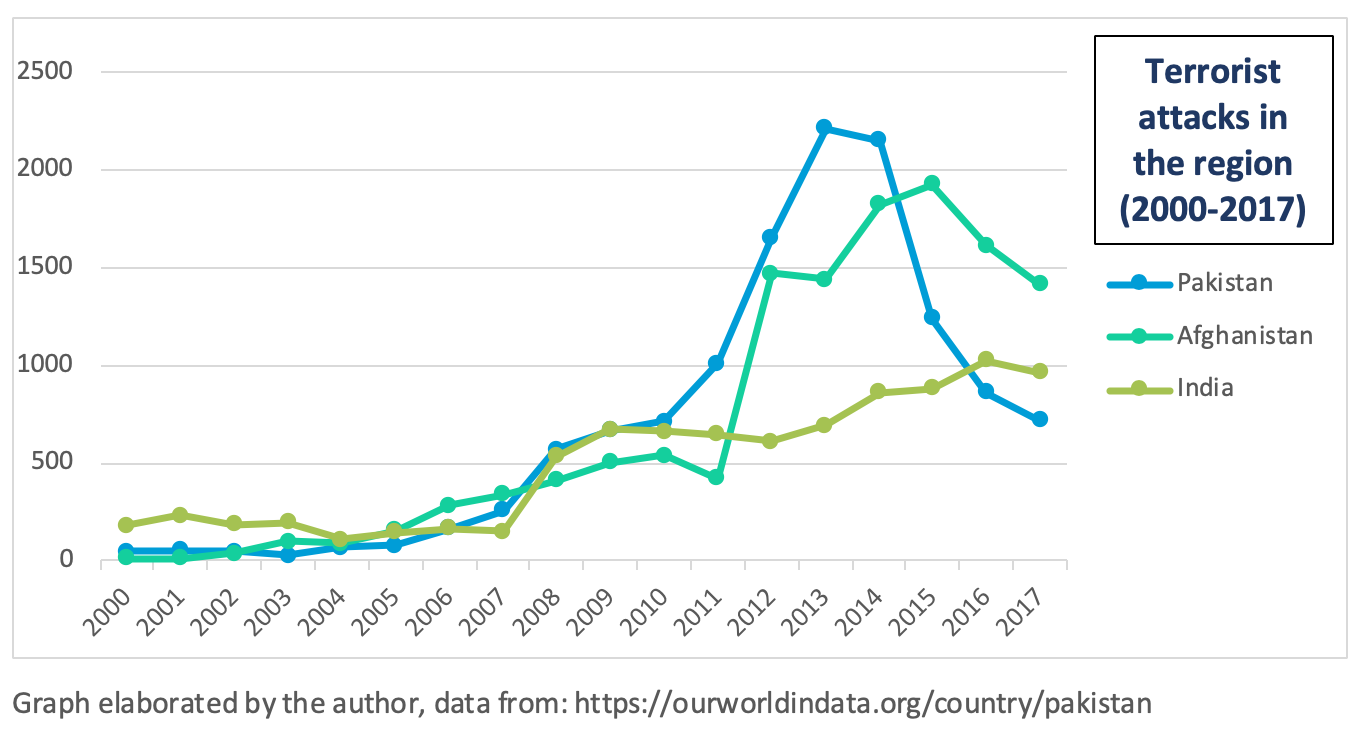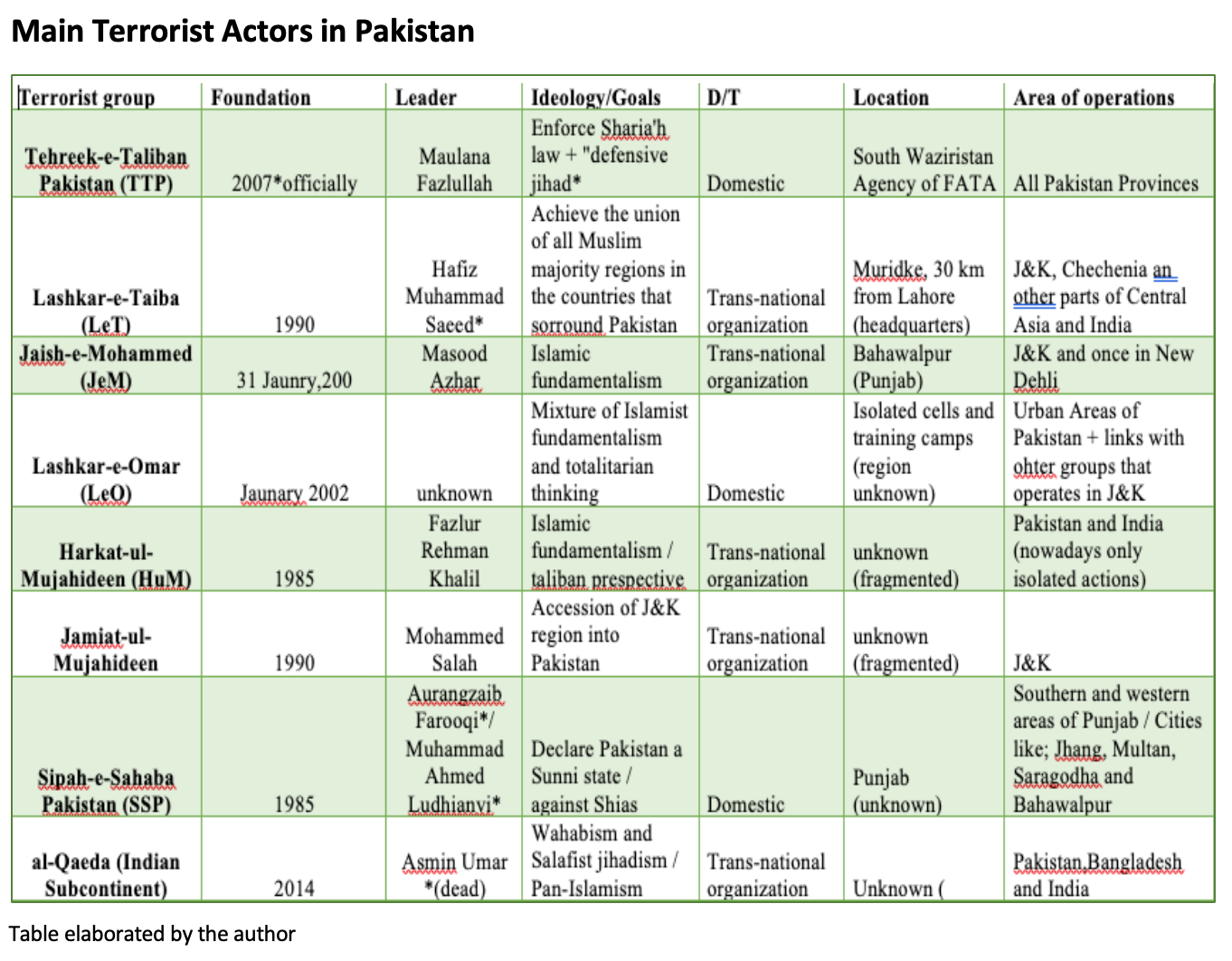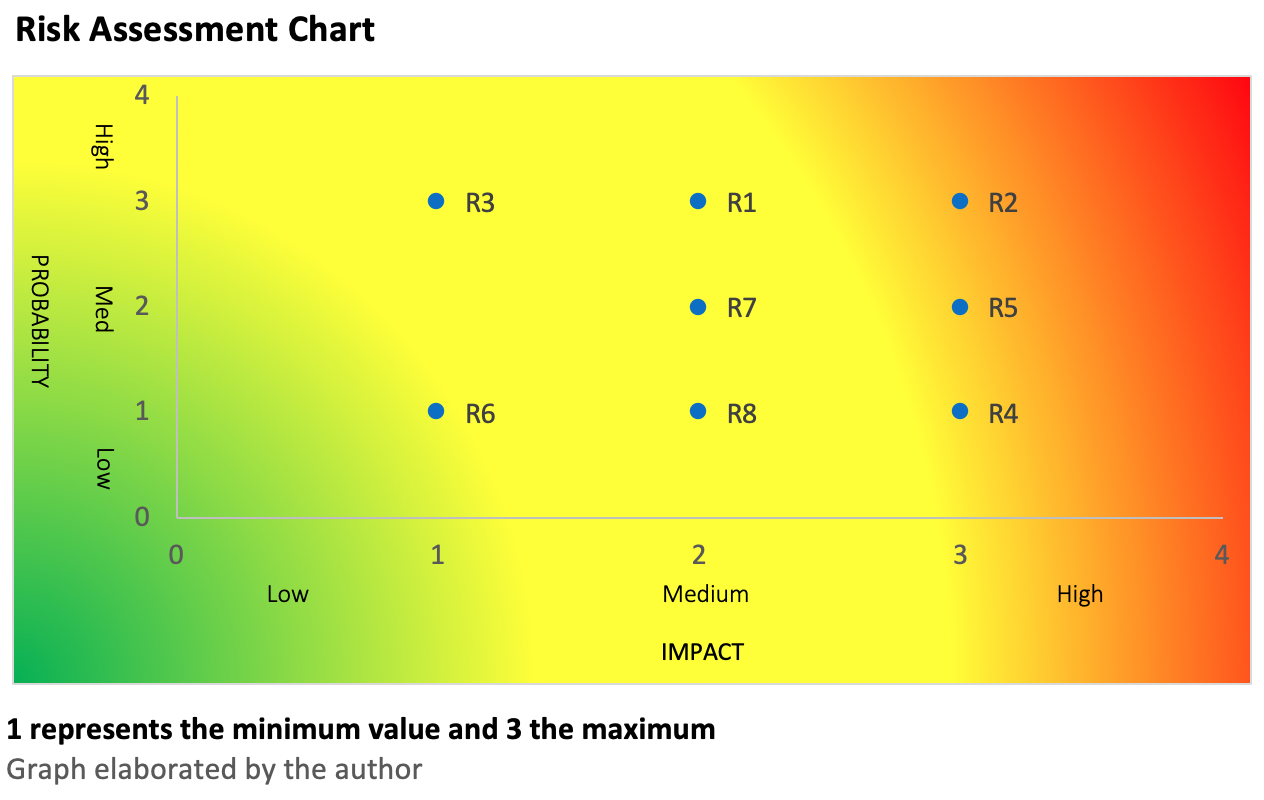Breadcrumb
Blogs
Entries with tag isi .
![Logo of Pakistan's Inter-Services Intelligence organization. It depicts Pakistan's national animal, Markhor, eating a snake [Wikipedia] Logo of Pakistan's Inter-Services Intelligence organization. It depicts Pakistan's national animal, Markhor, eating a snake [Wikipedia]](/documents/10174/16849987/pakistan-isi-blog.jpg)
▲ Logo of Pakistan's Inter-Services Intelligence organization. It depicts Pakistan's national animal, Markhor, eating a snake [Wikipedia]
ESSAY / Manuel Lamela
Jihadism continues to be one of the main threats Pakistan faces. Its impact on Pakistani society at the political, economic and social levels is evident, it continues to be the source of greatest uncertainty, which acts as a barrier to any company that is interested in investing in the Asian country. Although the situation concerning terrorist attacks on national soil has improved, jihadism is an endemic problem in the region and medium-term prospects are not positive. The atmosphere of extreme volatility and insistence that is breathed does not help in generating confidence. If we add to this the general idea that Pakistan's institutions are not very strong due to their close links with certain radical groups, the result is a not very optimistic scenario. In this essay, we will deal with the current situation of jihadism in Pakistan, offering a multidisciplinary approach that helps to situate itself in the complicated reality that the country is experiencing.


1. Jihadism in the region, a risk assessment
Through this graph, we will analyze the probability and impact of various risk factors concerning jihadist activity in the region. All factors refer to hypothetical situations that may develop in the short or medium term. The increase in jihadist activity in the region will depend on how many of these predictions are fulfilled.
Risk Factors:
R1: US-Taliban treaty fails, creating more instability in the region. If the United States is not able to make a proper exit from Afghanistan, we may find ourselves in a similar situation to that experienced during the 1990s. Such scenario will once again plunge the region into a fierce civil war between government forces and Taliban groups. The proposed scenario becomes increasingly plausible if we look at the recent American actions regarding foreign policy.
R2: Pakistan two-head strategy facing terrorism collapse. Pakistan’s strategy in dealing with jihadism is extremely risky, it’s collapse would lead to a schism in the way the Asian state deals with its most immediate challenges. The chances of this strategy failing in the medium term are considerably high due to its structure, which makes it unsustainable over the time.
R3: Violations of the LoC by the two sides in the conflict. Given the frequency with which these events occur, their impact is residual, but it must be taken into account that it in an environment of high tension and other factors, continuous violations of the LoC may be the spark that leads to an increase in terrorist attacks in the region.
R4: Agreement between the afghan Taliban and the government. Despite the recent agreement between Ashraf Ghani and Abdullah Albduallah, it seems unlikely that he will be able to reach a lasting settlement with the Taliban, given the latter's pretensions. If it is true that if it happens, the agreement will have a great impact that will even transcend Afghan borders.
R5: Afghan Taliban make a coup d’état to the afghan government. In relation to the previous point, despite the pact between the government and the opposition, it seems likely that instability will continue to exist in the country, so a coup attempt by the Taliban seems more likely than a peaceful solution in the medium or long term
R6: U.S. Democrat party wins the 2020 elections. Broadly speaking, both Republican and Democratic parties are betting on focusing their efforts on containing the growth of their great rival, China.
R7: U.S. withdraw its troops from Afghanistan regarding the result of the peace process. This is closely related to the previous point as it responds to a basic geopolitical issue.
R8: New agreement between India and Pakistan regarding the LoC. If produced, this would bring both states closer together and help reduce jihadist attacks in the Kashmir region. However, if we look at recent events, such a possibility seems distant at present.

2. The ties between the ISI and the Taliban and other radical groups
Pakistan's Inter-Services Intelligence (ISI) has been accused on many occasions of being closely linked to various radical groups; for example, they have recently been involved with the radicalization of the Rohingya refugees in Bangladesh[1]. Although Islamabad continues strongly denying such accusations, reality shows us that cooperation between the ISI and various terrorist organizations has been fundamental to their proliferation and settlement both on national territory and in the neighboring states of India and Afghanistan. The West has not been able to fully understand the nature of this relationship and its link to terrorism. The various complaints to the ISI have been loaded with different arguments of different kinds, lacking in unity and coherence. Unlike popular opinion, this analysis will point to the confused and undefined Pakistani nationalism as the main cause of this close relationship.
The Directorate for Inter-Services Intelligence, together with the Intelligence Bureau and the Military Intelligence, constitute the intelligence services of the Pakistani State, the most important of which is the ISI. ISI can be described as the intellectual core and center of gravity of the army. Its broad functions are the protection of Pakistan's national security and the promotion and defense of Pakistan's interests abroad. Despite the image created around the ISI, in general terms its activities and functions are based on the same "values" as other intelligence agencies such as the MI6, the CIA, etc. They all operate under the common ideal of protecting national interests, the essential foundation of intelligence centers without which they are worthless. We must rationalize their actions on the ground, move away from inquisitive accusations and try to observe what are the ideals that move the group, their connection with the government of Islamabad and the Pakistani society in general.
2.1. The Afghan Taliban
To understand the idiosyncrasy of the ISI we must go back to the war in Afghanistan[2], it is from this moment that the center begins to build an image of itself, independent of the rest of the armed forces. From the ISI we can see the victory of the Mujahideen on Afghan territory as their own, a great achievement that shapes their thinking and vision. But this understanding does not emerge in isolation and independently, as most Pakistani society views the Afghan Taliban as legitimate warriors and defenders of an honorable cause[3]. The Mujahideen victory over the USSR was a real turning point in Pakistani history, the foundation of modern Pakistani nationalism begins from this point. The year 1989 gave rise to a social catharsis from which the ISI was not excluded.
Along with this ideological component, it is also important to highlight the strategic aspect; we are dealing with a question of nationalism, of defending patriotic interests. Since the emergence of the Taliban, Pakistan has not hesitated to support them for major strategic reasons, as there has always been a fear that an unstable Afghanistan would end up being controlled directly or indirectly by India, an encircle strategy[4]. Faced with this dangerous scenario, the Taliban are Islamabad's only asset on the ground. It is for this reason, and not only for religious commitment, that this bond is produced, although over time it is strengthened and expanded. Therefore, at first, it is Pakistani nationalism and its foreign interests that are the cause of this situation, it seeks to influence neighboring Afghanistan to make the situation as beneficial as possible for Pakistan. Later on, when we discuss the situation of the Taliban on the national territory, we will address the issue of Pakistani nationalism and how its weak construction causes great problems for the state itself. But on Afghan territory, from what has been explained above, we can conclude that this relationship will continue shortly, it does not seem likely that this will change unless there are great changes of impossible prediction. The ISI will continue to have a significant influence on these groups and will continue its covert operations to promote and defend the Taliban, although it should be noted that the peace treaty between the Taliban and the US[5] is an important factor to take into account, this issue will be developed once the situation of the Taliban at the internal level is explained.
2.2. The Pakistani Taliban (Al-Qaeda[6] and the TTP)
The Taliban groups operating in Pakistan are an extension of those operating in neighboring Afghanistan. They belong to the same terrorist network and seek similar objectives, differentiated only by the place of action. Despite this obvious similarity, from Islamabad and increasingly from the whole of Pakistani society, the two groups are observed in a completely different way. On the one hand, as we said earlier, for most Pakistanis, the Afghan Taliban are fighting a legitimate and just war, that of liberating the region from foreign rule. However, groups operating in Pakistan are considered enemies of the state and the people. Although there was some support among the popular classes, especially in the Pashtun regions, this support has gradually been lost due to the multitude of atrocities against the civilian population that have recently been committed. The attack carried out by the Tehrik-i-Taliban Pakistan (TTP)[7] in the Army Public School in Peshawar in the year 2014 generated a great stir in society, turning it against these radical groups. This duality marks Pakistan's strategy in dealing with terrorism both globally and internationally. While acting as an accomplice and protector of this groups in Afghanistan, he pursues his counterparts on their territory. We have to say that the operations carried out by the armed forces have been effective, especially the Zarb-e-Azb operation carried out in 2014 in North Waziristan, where the ISI played a fundamental role in identifying and classifying the different objectives. The position of the TTP in the region has been decimated, leaving it quite weakened. As can be seen in this scenario, there is no support at the institutional level from the ISI[8], as they are involved in the fight against these radical organizations. However, on an individual level if these informal links appear. This informal network is favored by the tribal character of Pakistani society, it can appear in different forms but often draw on ties of Kinship, friendship or social obligation[9]. Due to the nature of this type of relationship, it is impossible to know to what extent the ISI's activity is conditioned and how many of its members are linked to Taliban groups. However, we would like to point out that these unions are informal and individual and not institutional, which provides a certain degree of security and control, at least for the time being, the situation may vary greatly due to the lack of transparency.
2.3. ISI and the radical groups that operate in Kashmir
Another part of the board is made up of the radical groups that focus their terrorist attention on the conflict with India over control of Kashmir, the most important of which are: Lashkar-e-Taiba (Let) and Jaish-e-Mohammed (JeM). Both groups have committed real atrocities over the past decades, the most notorious being the one committed by LeT in the Indian city of Mumbai in 2008. There are numerous testimonies, in particular, that of the American citizen David Haedy, which point to the cooperation of the ISI in carrying out the aforementioned attack.[10]
Recently, Hafiz Saeed, founder of Let and intellectual planner of the bloody attack, was arrested. The news generated some turmoil both locally and internationally and opened the debate as to whether Pakistan had finally decided to act against the radical groups operating in Kashmir. We are once again faced with a complex situation, although the arrest shows a certain amount of willpower, it is no more than a way of making up for the situation and relaxing international pressure. The above coincides with the FATF's[11] assessment of Pakistan's status within the institution, which is of great importance for the short-term future of the country's economy. Beyond rhetoric, there is no convincing evidence that suggests that Pakistan has made a move against those groups. The link and support provided by the ISI in this situation are again closely linked to strategic and ideological issues. Since its foundation, Pakistani foreign policy has revolved around India[12], as we saw on the Afghan stage. Pakistani nationalism is based on the maxim that India and the Hindus are the greatest threat to the future of the state. Given the significance of the conflict for Pakistani society, there has been no hesitation in using radical groups to gain advantages on the ground. From Pakistan perspective, it is considered that this group of terrorists are an essential asset when it comes to putting pressure on India and avoiding the complete loss of the territory, they are used as a negotiating tool and a brake on Indian interests in the region.
As we can see, the core between the ISI and certain terrorist groups is based on deep-seated nationalism, which has led both members of the ISI and society, in general, to identify with the ideas of certain radical groups. They have benefited from the situation by bringing together a huge amount of power, becoming a threat to the state itself. The latter has compromised the government of Pakistan, sometimes leaving it with little room for maneuver. The immense infrastructure and capacity of influence that Let has thanks to its charitable arm Jamaat-ud-Dawa, formed with re-localized terrorists, is a clear example of the latter. A revolt led by this group could put Islamabad in a serious predicament, so the actions taken both in Kashmir and internally to try to avoid the situation should be measured very well. The existing cooperation between the ISI and these radical groups is compromised by the development of the conflict in Kashmir, which may increase or decrease depending on the situation. What is certain, because of the above, is that it will not go unnoticed and will continue to play a key role in the future. These relationships, this two-way game could drag Pakistan soon into an internal conflict, which could compromise its very existence as a nation.
[1] Ahmed, Zobaer. "Is Pakistani Intelligence Radicalizing Rohingya Refugees? | DW | 13.02.2020". DW.COM, 2020.
[2] Idrees, Muhammad. Instability In Afghanistan: Implications For Pakistan. PDF, 2019.
[3] Lieven, Anatol. Pakistan a Hard Country. 1st ed. London: Penguin, 2012.
[4] United States Institute for Peace. The India-Pakistan Rivalry In Afghanistan, 2020.
[5] Maizland, Lindsay. "U.S.-Taliban Peace Deal: What To Know". Council On Foreign Relations, 2020.
[6] Blanchard, Christopher M. Al Qaeda: Statements And Evolving Ideology. PDF, 2007.
[7] Mapping Militant Organizations. “Tehrik-i-Taliban Pakistan.” Stanford University. Last modified July 2018.
[8] Gabbay, Shaul M. Networks, Social Capital, And Social Liability: The Cae Of Pakistan ISI, The Taliban And The War Against Terrorism.PDF, 2014. http://www.scirp.org/journal/sn.
[9] Lieven, Anatol. Pakistan a Hard Country. 1st ed. London: Penguin, 2012.
[10] Lieven, Anatol. Pakistan a Hard Country. 1st ed. London: Penguin, 2012.
[11] "Pakistan May Remain On FATF Grey List Beyond Feb 2020: Report". The Economic Times, 2019.
[12] "India And Pakistan: Forever Rivals?". Aljazeera.Com, 2017.
